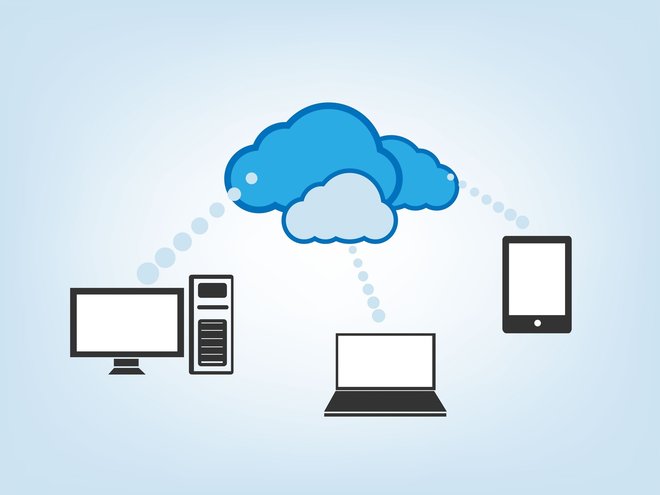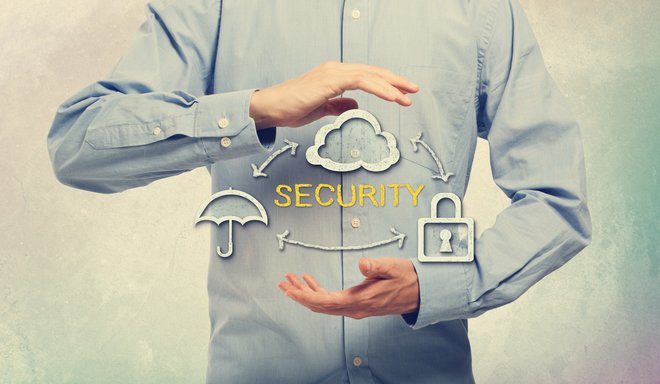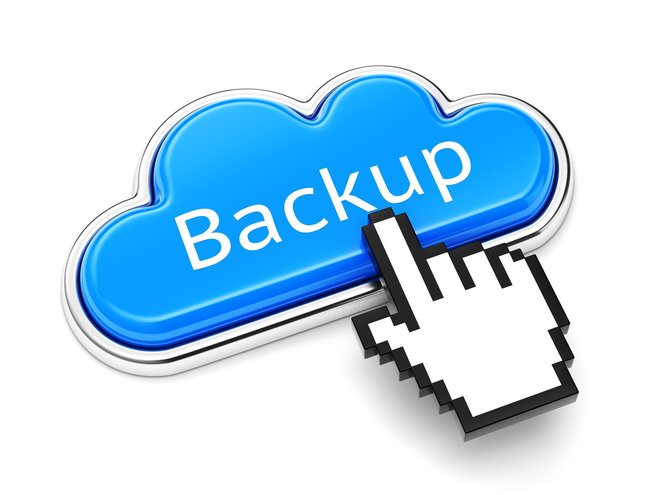"Where are our vacation shots? Are they gone?" The women seemed on the verge of a stress-related demise while holding her crushed cellphone in her hands. With a smile, her husband (obviously a model for tooth bleaching) turned around and replied in a calm voice: "They can't be gone, they're in the cloud!" Domestic bliss had returned, it was joy all over again, the coffee is ready.
That about sums up the essence of most ads run by cloud service providers. It doesn't matter if a piano drops on you, you're data will still be safe. Whether that's the case is another story since ads are known to exaggerate.

Let's start at the beginning: Using cloud storage means your data (photos, documents and even entire backups) has to be uploaded to a server provided by a cloud service provider. This server is basically an Internet connected hard disk. To access your files later, you simply download them to your local disk. In the case of Dropbox, this means you'll have an app on your cellphone, tablet and computer that allows you to upload/download files through all of your devices. This comes in handy when you need to access a document from any place or work collaboratively on the same document with others. At first, the idea that everything is safe and sound and always accessible online seems great.
My cellphone is a good example that perfectly demonstrates the fine line between convenience and privacy/security thinking. If I wanted, I could have all my data back upped to the cloud to the point where, should I have to get a replacement of the same brand and model, I could simply log into my cloud service and have all my files, contacts, photos etc. restored to their original state. Sounds great, right? At least until you start thinking about what gets saved - and where.Do I really want to have my biometric passport photo stored on some server in China though I know nothing about their security measures and data privacy policies?
 Secure in the cloud - slight headaches included
Secure in the cloud - slight headaches included
Naturally, storage providers take the utmost care and apply immaculate security measures, by their account. Everything is continuously monitored with state of the art technology and all file transfers are encrypted. Is that enough to calm me down? File encryption, as provided by most cloud services, is a bit of a two-edged sword since the encryption key is also stored on their machines. This means their staff can access my files and so can every hacker that manages to break into their systems.
Furthermore, even the biggest players provide little to no details on the whereabouts of their servers. Google, Microsoft and many others are unusually discreet about this information. What good are fierce looking administrators that fight day and night to protect my data against hackers when their own government would like to take a look at my stuff? How easy is it to snoop around in my files? After all, there are huge differences in laws between Europe and the United States! The current legal dispute between the FBI and Apple shows how easily national interests can collide with data protection and privacy. And by the way: The thought of Kim Jong Un looking at the photos from my last barbecue party is frightening.
It also pays to look closely at the privacy policies of each cloud service provider. While Microsoft OneDrive happily scans all your files for illegal content, other providers collect data to share it with "trustworthy third parties". Naturally, many providers need to process your name, your email address, your phone number, your bank account information and your mailing address to "improve their own services". And we'd all love to believe that. Here's a tip: Before signing up with a cloud storage provider take the time to study their data policies and EULA. It'll surely make for a thrilling reading experience!
 Click just once and everything gets saved somewhere, somehow
Click just once and everything gets saved somewhere, somehow
When I think of the cloud I can't help but also think of hackers. Reports of hacked cloud services come out quite regularly and few providers such as Evernote or Dropbox openly admit to that. Every company knows that customer trust is key to business success which is why most companies choose to stay tight-lipped. The rational computer scientist in me says that big providers probably take better care of data protection than I do in my own four walls. If your business depends on your ability to protect against hackers, you'll most likely take maximum precautions. Then again, when I lose my data it's my fault. When hackers have invaded the cloud, I can do nothing but wait and see how bad the damage will be. Entrusting someone else with your data requires a leap of faith.
That's why I have decided to only upload files to the cloud that I have encrypted myself. Programs such as Ashampoo Backup Pro 10 encrypt your data with strong AES-256 encryption that, to this date, hasn't been broken. Aborange Crypter or Steganos Save (and many others) also encrypt your files before uploading them to the cloud. This helps bridge the gap between the advantages of cloud services and the benefits of keeping your own data safe. And if you don't feel like joining the cloud, pull that external hard disk out of your drawer and use that instead. Works just as well!




My concerns with the "Cloud" are: What will happen to my data if a company gets sold or goes bankrupt, who is responsible for my data? Is it saved on multiple servers?
I do use the cloud so I may access data anywhere, but it's data that already exists in my backup plan.
My own backup plan, which i have been using since the early '80s, consists of a main backup disk, 3 external drives and a large collection of CDs & DVDs. Yes, I've lost plenty of data, only it has been by my own hand.
For me, the "Cloud" is useful, just not a secure backup solution.
Thanks Sven!
For optimum security, I think an in-house external hard drive is probably the best idea.
Do your backup and then physically disconnect the drive.
A disc that is not connected and not powered cannot be accessed.
Bert.
Generally speaking, I distrust cloud services with what I deem to be sensitive financial data.
On the other hand, I am happy to upload my photographs - some of my most important life-memories, because I seriously doubt that they would have any value except to myself and my family.
So my opinion is that material that might benefit others is better kept in a filing cabinet at home, and that other material that may be precious to me, but is largely irrelevant to others, is best kept on the cloud.
Great article. I also agree with most all comments. Keep up the great articles. this is why I buy most of my software from Ashampoo. I have always backed up on external Hard drives.
Thanks a lot! I’ve just returned from a short vacation and it now feels twice as good to get some praise. :)
Enjoyed this and I have decided that I will NOT use the cloud. To much of a risk.
I was wondering about the above , and since I do have a very large unused hard drive , I just may use that .
thanks.
Al
Encrypting everything is too time consuming, so seems sensible to have one or more folders on your computer which are kept encrypted, with sensitive info, and all the rest unencrypted. Then copy as much as possible onto clouds with no worries, either up there or down here.
I find the concept of the cloud to be a con. Irrespective of the claimed security of the cloud by the company, the data is just not safe. Having spent several years working on IT security its totally fallacious to claim that the cloud stored data could not be accessed if it was proved worth the effort.
Amen to everyone's comments. What I don't understand is my work is doing the same thing - relegating our services to the Cloud.
As someone has already commented, disaster always seems like a good idea at the time.
Interesting and useful
Why use 'China' as a negative example? Why would a host to US or European customers use servers almost as far away as you can get from those locations?
Anyway services like Baidu Cloud offer 2TB of free storage. I've never had any problems using it for non-essential data and student assignments. You can always use a translator for the ToS and Privacy policy.
Using NAS is a more private solution.
Would I keep all my documents, 'photos, and all my other storable information in an empty, 'lockable' desk in the home of a friend who also gave me a key to his front door before the home Internet was commenced.
NO!
One day the clouds formed and the pouring rain came down for many days and nights and the area where my friend lived was severely flooded, everything in my friend's house was totally destroyed.
The 'What If' factor should be put into play, not the 'I think it should be OK' factor.
Hindsight is useless after the event.
First let me quoit this old saying, "If it's to good to be true, chances are, it's not," in some words or another!
I'm all for technology don't get me wrong, but let's face some facts. The US Government was hounding Apple to give them the keys to the hen house. They sad they were not able to by pass the password on one of Apples cellphones. They just wanted the easy way to pry into your privet information. It turned out that they were able to break the code any way , they just had to work for it!
If that's the case just how secure do you think cloud is after all. I say if any thing is so important it needs to be backed up Save to a hard disk or a data DVD. Can you really trust any one other that yourself to look after your important data I DON"T THINK SO
Do great minds think alike? A few days ago I received a notice from Microsoft saying they were dropping storage to 5 gigabytes on OneDrive. Over the years MS gave me 50 gigs. I was using most of it to store scans of photos from 35mm film taken over the last 35 years. Wasn't I silly to trust Microsoft with those photographs? They are now on an external hard drive. There was also a huge collaborative project stored on OneDrive. It's also downloaded while we try to find a suitable "cloud" so we continue to work on it. Luckily I have friends in Germany who may have a solution.
:)
I must admit that I'm still a tad "old school" when it comes to backups - I have a dedicated pc for the job and with 4 x 4TB hdd's I think my storage/backup woes will be minimal. It only really gets turned on to do the backup or monthly OS updates.
Oh yes, I've got the bonus cloud storage options for the non-essential bbq photos, and that's great...but my essential files, well, I think I'll be in control of that process for a while yet...
As far as I am concerned - and I have been doing computer security for decades - the cloud (anyone's) is a security risk that I can certainly do without. In my universe, safety trumps convenience every time.
I encrypt and use my external hard drive. I control - no dependency on anyone but me, and I like it that way.
Just found that Win Optimizer 12 has an encryption feature that is AES 256 bit strong.
No cloud , plus I encrypt the files that need to be encrypted.
But, thanks for the article.
I am quite inclined to agree with you, "pull that external hard disk out of your drawer and use that instead". I have two 500 GB external hard disks that I alternate for each backup. When I create a new backup I take the current one to my bank and swap it with the other one in my safety deposit box. That way I always have the latest version stored somewhere reasonably safe in case my house burns down or is burglarized. I am considering taking this one step further. When I bought my last computer I got a Dell 7010 Ultra Small Form Factor with a 128GB SSD drive. I decided that wasn't large enough so I bought a Samsung 250GB SSD. The nice thing is that new drive came with a piece of software that can clone the entire drive onto an external drive. So I bought a second 250GB SSD drive. When I decided to try Windows 10, I cloned my entire Windows 7 SSD drive onto the external SSD drive. That way I could easily go back by just swapping the drives. An added benefit is because they are both SSD drives the process is very fast. Everything is copied, the operating system, all installed software, cookies and all that stuff and all my data, photos, etc. So, I may look to that as my backup method. I need to try cloning the SSD drive to my external HDD drive to see how long that takes.
Greetings all,
The Cloud as you rightly point out is just another disk somewhere else. Security??? Having worked in computer operations for nearly 30 years. I think my backups are secure and safe. They are not available to every Tom, Dick and Harry. The PR regarding the Cloud is rather misleading. It's just another Server. No more safe than a regular backup at home. Regards, John l.
Okay, so I am not a computer geek. I am 70 years old and do not know how to encrypt what I need to encrypt or if I could even read it. If I get a new computer can I read thing I encrypted using my old computer?
See I told you I know nothing about encrypting anything or unencryptng or it if that is even a word.
In other words I am encrypt illiterate.
The "cloud" has a wide spectrum of credibility. The rule of thumb to remember, "Do not put all of your eggs in one basket". Use the cloud as "part" of your total solution. Mainly it should be your "off-site" answer. One should also have it on multiple external HDDs at home; for easy and inexpensive backup. With the prices going down as they have, one can double the storage on has every other year and thus replace the older drives once they get full. Do not ever think the hard drive in your notebook or table is not going to die sooner than you think.
I couldn't agree more. As a retired i.t. bod, this has always been my view. Why on earth would you save all your files to Lord knows where when an external hard disc can do it and probably a lot faster if there is a lot of data to back-up.
the cloud? .. it might have seemed like a good idea .. but most disasters do.
Sure :)